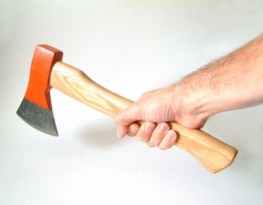Gainfully Unemployed
by Ben Resnick
A 35-year-old Wisconsin man was recently fired from his job at Qdoba after he trashed the place, throwing pots, pans, desserts, and boxes of hot sauce on the floor. His motive? He claimed he was trying to get fired so he could collect unemployment insurance. Apparently, nobody told him that Wisconsin only pays unemployment benefits for certain types of separations. Not surprisingly, getting fired for intentional wrongdoing isn't covered.
Nearly everyone has had a job they despised. At some point the earnings from the job no longer outweigh the costs of sticking with it. The typical reaction is to simply quit and begin look for a better job. True, the newly unemployed worker will no longer collect any wages. But the added leisure time and the prospect of better work are presumably more than enough compensation for the lost earnings.
During the current economic downturn, fears about prolonged unemployment may make another option more viable: getting fired or laid off. While those who quit are not eligible for government unemployment insurance benefits, those who get fired or laid off might be.
Although the Wisconsin man was unaware that trashing his place of employment would disqualify him for unemployment benefits, other workers may devise less obvious ways of getting themselves removed from their unpleasant job. If they land themselves in the ranks of the unemployed without compromising their unemployment insurance eligibility, they'll be out of an unwanted job and into a welcome series of government checks.
In normal times, the Wisconsin man may have simply quit, but it's not hard to believe that concerns over prolonged unemployment, combined with a dicey understanding of unemployment insurance eligibility, made this decision unacceptable.
It turns out that unemployment benefits influence worker decisions about whether to take a job as well. Search theory economists showed that the last time the British government reduced the number of weeks fired employees could collect unemployment insurance, the average duration of unemployment shrunk by the number of weeks that unemployment benefits were no longer paid.
Discussion Questions
1) Part of the federal economic stimulus package gives state governments the option of using funds to extend the amount of time that an unemployed person can collect benefits. What trade-off do governments face when they choose to extend the duration of unemployment benefit eligibility during tough economic times?
2) At the root of this entire disturbance was the worker's goal to qualify for unemployment. If he had been better informed about the rules regarding dismissal for cause, how would this change his decision?
3) How might a worker hoping to shake lose of a lousy job and collect unemployment insurance benefits game the system?
4) Ignoring cases where those fired are not elligible, would you expect to observe behavior where people seek to get fired to collect unemployment more among high-skill or low-skill workers? Which group typically faces more competition in the job market and has a harder time finding a new job? How are these two ideas related?
Nearly everyone has had a job they despised. At some point the earnings from the job no longer outweigh the costs of sticking with it. The typical reaction is to simply quit and begin look for a better job. True, the newly unemployed worker will no longer collect any wages. But the added leisure time and the prospect of better work are presumably more than enough compensation for the lost earnings.
During the current economic downturn, fears about prolonged unemployment may make another option more viable: getting fired or laid off. While those who quit are not eligible for government unemployment insurance benefits, those who get fired or laid off might be.
Although the Wisconsin man was unaware that trashing his place of employment would disqualify him for unemployment benefits, other workers may devise less obvious ways of getting themselves removed from their unpleasant job. If they land themselves in the ranks of the unemployed without compromising their unemployment insurance eligibility, they'll be out of an unwanted job and into a welcome series of government checks.
In normal times, the Wisconsin man may have simply quit, but it's not hard to believe that concerns over prolonged unemployment, combined with a dicey understanding of unemployment insurance eligibility, made this decision unacceptable.
It turns out that unemployment benefits influence worker decisions about whether to take a job as well. Search theory economists showed that the last time the British government reduced the number of weeks fired employees could collect unemployment insurance, the average duration of unemployment shrunk by the number of weeks that unemployment benefits were no longer paid.
Discussion Questions
1) Part of the federal economic stimulus package gives state governments the option of using funds to extend the amount of time that an unemployed person can collect benefits. What trade-off do governments face when they choose to extend the duration of unemployment benefit eligibility during tough economic times?
2) At the root of this entire disturbance was the worker's goal to qualify for unemployment. If he had been better informed about the rules regarding dismissal for cause, how would this change his decision?
3) How might a worker hoping to shake lose of a lousy job and collect unemployment insurance benefits game the system?
4) Ignoring cases where those fired are not elligible, would you expect to observe behavior where people seek to get fired to collect unemployment more among high-skill or low-skill workers? Which group typically faces more competition in the job market and has a harder time finding a new job? How are these two ideas related?
Labels: Incentives, Unemployment



0 Comments:
Post a Comment
<< Home